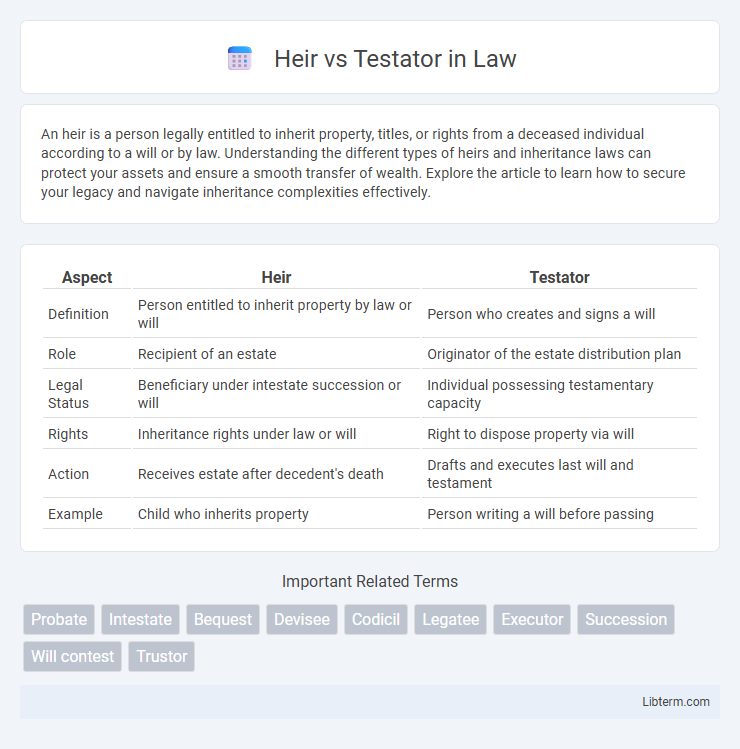An heir is a person legally entitled to inherit property, titles, or rights from a deceased individual according to a will or by law. Understanding the different types of heirs and inheritance laws can protect your assets and ensure a smooth transfer of wealth. Explore the article to learn how to secure your legacy and navigate inheritance complexities effectively.
Table of Comparison
| Aspect | Heir | Testator |
|---|---|---|
| Definition | Person entitled to inherit property by law or will | Person who creates and signs a will |
| Role | Recipient of an estate | Originator of the estate distribution plan |
| Legal Status | Beneficiary under intestate succession or will | Individual possessing testamentary capacity |
| Rights | Inheritance rights under law or will | Right to dispose property via will |
| Action | Receives estate after decedent's death | Drafts and executes last will and testament |
| Example | Child who inherits property | Person writing a will before passing |
Definition of Heir
An heir is a person legally entitled to receive a portion or the entirety of a deceased individual's estate, typically by statutory inheritance laws. Unlike a testator, who is the individual creating a will to distribute their assets, an heir inherits assets automatically if no valid will exists or under the terms of the will. Heirs can include spouses, children, descendants, or other relatives as specified by jurisdictional inheritance rules.
Definition of Testator
A testator is an individual who creates a legally binding will to distribute their assets and property after death. Unlike an heir, who is a person entitled to inherit under the will or by law, the testator actively determines beneficiaries and the allocation of the estate. The testator must have testamentary capacity, meaning they understand the implications of their decisions and the extent of their property.
Key Legal Differences
An heir is an individual entitled to inherit property under state intestacy laws when a person dies without a valid will, while a testator is a person who creates a will to specify the distribution of their estate. The primary legal difference lies in control: a testator directs asset allocation through a legally binding document, whereas an heir's rights arise automatically by operation of law in the absence of a will. Furthermore, heirs may be subject to state-specific succession statutes, whereas the testator's wishes prevail if the will meets formal legal requirements.
Roles and Responsibilities
The testator is the individual who creates a will, specifying the distribution of assets and appointing executors to manage the estate. Heirs are the beneficiaries named in the will or determined by law who receive the property or benefits left by the testator. While the testator holds the responsibility of clearly outlining their wishes, heirs have the role of accepting and managing the inherited assets according to the will's terms or legal guidelines.
Rights of an Heir
An heir possesses legal rights to inherit the estate of a deceased person, typically defined by intestate succession laws when no valid will exists. Unlike a testator who creates the will specifying asset distribution, an heir's rights depend on statutory entitlements and can include claims to property, debts, and other estate assets. Courts often protect heirs' rights to ensure fair distribution in accordance with the law, preventing undue disinheritance or exclusion.
Duties of a Testator
A testator is responsible for drafting a valid will that clearly outlines the distribution of their estate to heirs and beneficiaries, ensuring all legal requirements are met to prevent disputes. They must update the will as circumstances change, such as marriages, births, or changes in asset ownership, to accurately reflect their intentions. The testator also has the duty to appoint an executor to administer the estate according to the will's provisions after their death.
Succession Laws Explained
A testator is the individual who creates a will to distribute their estate after death, while an heir is a person entitled to inherit under succession laws if no valid will exists. Succession laws determine how assets are allocated either through testamentary disposition or intestate succession, prioritizing heirs based on legal relationships such as spouse, children, or blood relatives. Understanding the distinction between testator and heir is crucial for interpreting inheritance rights and the application of estate laws in civil and common law jurisdictions.
Common Misconceptions
The terms "heir" and "testator" are often confused, but they describe distinct roles in estate law; the testator is the individual who creates a will, while heirs are those entitled to inherit under a will or by law if no will exists. A common misconception is that heirs always inherit property directly from the testator's will, whereas some heirs may have rights under intestate succession laws if the testator dies without a valid will. Clarifying these roles is essential for understanding inheritance rights and the probate process in jurisdictions following common law.
Importance in Estate Planning
In estate planning, distinguishing between an heir and a testator is crucial for ensuring assets are distributed according to the individual's wishes. The testator is the person who creates a will, specifying how their estate should be managed and allocated, while heirs are the individuals legally entitled to inherit under the will or by intestate succession laws. Understanding these roles helps prevent disputes and enables precise drafting of estate documents to safeguard the testator's intentions.
Frequently Asked Questions
Heirs are individuals legally entitled to inherit property or assets according to intestate succession laws, while testators are persons who create a valid will specifying asset distribution upon their death. Frequently asked questions explore differences in legal roles, the rights of heirs when a will exists, and how testators can change beneficiaries. Understanding these distinctions clarifies inheritance processes and the impact of wills on estate planning.
Heir Infographic

 libterm.com
libterm.com